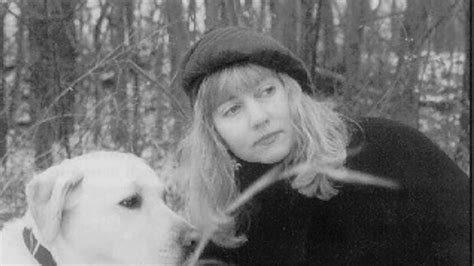A Quote by William Shakespeare
IAGO: She that was ever fair and never proud, Had tongue at will and yet was never loud, Never lack'd gold and yet went never gay, Fled from her wish and yet said 'Now I may,' She that being anger'd, her revenge being nigh, Bade her wrong stay and her displeasure fly, She that in wisdom never was so frail To change the cod's head for the salmon's tail; She that could think and ne'er disclose her mind, See suitors following and not look behind, She was a wight, if ever such wight were,-- DESDEMONA: To do what? IAGO: To suckle fools and chronicle small beer.
Related Quotes
She had said she didn't feel fear, but it was a lie; this was her fear: being left alone. Because of one thing she was certain, and it was that she could never love, not like that. Trust a stranger with her flesh? The closeness, the quiet. She couldn't imagine it. Breathing someone else's breath as they breathed yours, touching someone, opening for them? The vulnerability of it made her flush. It would mean submission, letting down her guard, and she wouldn't. Ever. Just the thought made her feel small and weak as a child.
Tessa had begun to tremble. This is what she had always wanted someone to say. What she had always, in the darkest corner of her heart, wanted Will to say. Will, the boy who loved the same books she did, the same poetry she did, who made her laugh even when she was furious. And here he was standing in front of her, telling her he loved the words of her heart, the shape of her soul. Telling her something she had never imagined anyone would ever tell her. Telling her something she would never be told again, not in this way. And not by him. And it did not matter. "It's too late", she said.
She stared at herself in the mirror. Her eyes were dark, almost black, filled with pain. She'd let someone do that to her. She'd known all along she felt things too deeply. She became attached. She didn't want a lover who could walk away from her, because she could never do that - love someone completely and survive intact if her left her.
I hope through The L Word to become an honorary member of the gay tribe. I cherish the thought that some young girl or woman somewhere may one night turn on the television and for the first time ever see her life represented - not as an isolated incident but as a multiplicity. Her overwhelming fear may have been that she might never find her tribe, she might never find love and now she knows that they are both out there waiting for her.
SHE is neither pink nor pale, And she never will be all mine; She learned her hands in a fairy-tale, And her mouth on a valentine. She has more hair than she needs; In the sun ’tis a woe to me! And her voice is a string of colored beads, Or steps leading into the sea. She loves me all that she can, And her ways to my ways resign; But she was not made for any man, And she never will be all mine.
She came into a room; she stood, as he had often seen her, in a doorway with lots of people round her. But it was Clarissa one remembered. Not that she was striking; not beautiful at all; there was nothing picturesque about her; she never said anything specially clever; there she was however; there she was.
She wondered whether there would ever come an hour in her life when she didn't think of him -- didn't speak to him in her head, didn't relive every moment they'd been together, didn't long for his voice and his hands and his love. She had never dreamed of what it would feel like to love someone so much; of all the things that had astonished her in her adventures, that was what astonished her the most. She thought the tenderness it left in her heart was like a bruise that would never go away, but she would cherish it forever.
But this was that view of human destiny which she had most passionately hated and rejected: the view that man was ever to be drawn by some vision of the unattainable shining ahead, doomed ever to aspire, but not to achieve. Her life and her values could not bring her to that, she thought; she had never found beauty in longing for the impossible and had never found the possible to be beyond her reach.
She'd assumed she'd be married and have kids by this age, that she would be grooming her own daughter for this, as her friends were doing. She wanted it so much she would dream about it sometimes, and then she would wake up with the skin at her wrists and neck red from the scratchy lace of the wedding gown she'd dreamed of wearing. But she'd never felt anything for the men she'd dated, nothing beyond her own desperation. And her desire to marry wasn't strong enough, would never be strong enough, to allow her to marry a man she didn't love.
The magnificent thing about her [Amelia Earhart] is, in the eyes of the world, she simply never died. Her fear never witnessed, her failure never recorded, her shiny twin-engine Electra never recovered. Earhart's legacy of inspiration is amplified because her adventure is perpetual. We don't think of her as dead; we think of her as missing. She is forever flying, somewhere beyond Lae, over that limitless blue horizon.







































